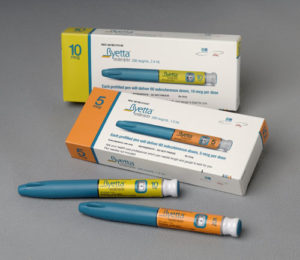 Individuals who are diagnosed with pancreatic cancer linked to Byetta (exenatide) may required extensive medical tests and treatment. Pancreatic cancer is conclusively diagnosed with a biopsy, but other tests may also be necessary — including ultrasounds, MRIs, CT scans, and more.
Individuals who are diagnosed with pancreatic cancer linked to Byetta (exenatide) may required extensive medical tests and treatment. Pancreatic cancer is conclusively diagnosed with a biopsy, but other tests may also be necessary — including ultrasounds, MRIs, CT scans, and more.
Do I Have a Texas Byetta Lawsuit? Collen A. Clark is a true advocate for his clients and is passionate about helping Texans that have been injured or wronged. If you or a loved one was injured by Byetta, you should contact our lawyers immediately. You may be entitled to compensation by filing a Byetta lawsuit in Texas.
Byetta and Pancreatic Cancer Diagnosis
Conclusive diagnosis of pancreatic cancer requires a biopsy (tissue sample) of the tumor. Unfortunately, by the time diagnosis occurs, more than 80% of people are diagnosed with a cancer that has already metastasized (spread to other organs or tissues). Early diagnosis of pancreatic cancer is rare because it rarely produces symptoms in its early stages. If there are symptoms, these may include:
- Abdominal pain
- Nausea, diarrhea
- Weight loss
- Itching
- Jaundice (yellowing of the skin, eyes)
Tests for Pancreatic Cancer
Patients who are diagnosed with pancreatic cancer after using Byetta may need to undergo the following tests:
- Blood tests: Pancreatic cancer produces certain bio-markers and hormones which can be detected in the blood. However, by the time blood levels are high enough to be detected, the cancer has usually spread. Blood tests are also used to check the general health of the pancreas, kidneys, liver, etc.
- CT scan: This test uses a series of X-ray images to create a 3D image of the abdomen.
- Magnetic resonance imaging (MRI): This test uses magnetic waves to create an image of the abdomen.
- Ultrasound: This test uses sound waves to produce images of internal organs. A wand-shaped device called a transducer is placed on the abdomen, where it emits sound waves that bounce off internal organs and produce an image.
- Endoscopic ultrasound: This type of ultrasound is more accurate for diagnosing pancreatic cancer in Byetta patients. An endoscope is a long, flexible tube with a tiny ultrasound emitter. It is passed through the patient’s esophagus and stomach and pointed at the pancreas to get a picture of the pancreas and small tumors.
- Biopsy: The only way to conclusively diagnose pancreatic cancer is by removing a small piece of the tumor and looking at it under a microscope. There are minimally-invasive biopsy techniques that go through the skin using a long, thin needle.
Do I have a Byetta Lawsuit in Texas?
Collen A. Clark is a true advocate for his clients and is passionate about helping Texans that have been injured or wronged.
Collen’s amazing success in the courtroom and well known dedication to his clients has earned him the recognition of his peers as one of The Top Trial Lawyers in Texas.”
The Clark Firm has assembled a team of trial lawyers with more than 100 years experience, participation in over 600 jury trials and $60 million in verdicts and/or settlements. Please use the form below to contact us for a free Texas Byetta lawsuit review.


 To contact us for a free review of your potential case, please fill out the form below or call us toll free 24 hrs/day by dialing:
To contact us for a free review of your potential case, please fill out the form below or call us toll free 24 hrs/day by dialing: